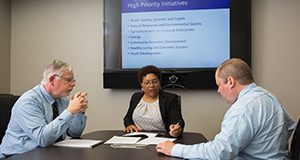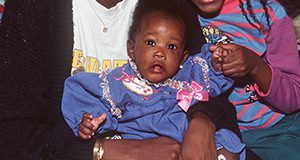Proposals possessing sound and well-funded evaluation plans are normally stronger and have greater chances of being funded. This new 4-page publication of the UF/IFAS Department of Agricultural Education and Communication shares information the authors learned during a series of meetings with federal agency program officers and evaluators about best practices for grant proposals. The practices encompass two broad categories: incorporating evaluation expertise into the project team and building a sound project rationale and evaluation plan. By adopting these practices, you will enhance the quality of your proposals; you will most likely increase the amount of extramural funding that is secured; and you will elevate the visibility and impact of programs within your organization. Written by Glenn Israel, Jaclyn D. Kropp, David C. Diehl, Conner Mullally, and Sebastian Galindo.
https://edis.ifas.ufl.edu/wc350
Tag: David C. Diehl
Overview of Extension Program Planning Models

The use of program plan development models within Extension has a long history of application based on environmental context, interest, and perceived value. The purpose of this 6-page article is to articulate a comparative overview of the various program planning models designed and employed by Extension professionals in education contexts. Written by John Diaz, Cody Gusto, and David Diehl and published by the UF/IFAS Department of Agricultural Education and Communication, January 2018.
http://edis.ifas.ufl.edu/wc289
Developing a Program Plan Based on the Program Planning Cycle
For over a century, Extension programs have used specific program development plans to create or refine services for clientele. This 6-page article seeks to provide an overview of fundamental tenets within program planning, how a planning process informs a development plan, and why these components are integral to Extension services. Written by John Diaz, Cody Gusto, and David Diehl and published by the UF/IFAS Department of Agricultural Education and Communication, December 2017.
http://edis.ifas.ufl.edu/wc290
Caregivers, Caseworkers, and Biological Parents: Risk Factors for Foster Teen Pregnancy and Ways You Can Make a Difference
Many teens exhibit risk-taking behavior. That said, the past experiences of foster care youth in particular make them likely to engage in activity that could cause teen pregnancy and sexually transmitted infections. This 9-page fact sheet is designed to provide kin and foster caregivers, caseworkers, and biological parents of children in foster care with information about the physical, emotional, and psychological concerns related to teen reproductive health in the foster care system. It also aims to help all involved identify the risk factors associated with foster teen pregnancy and explains legal rights regarding foster teen health. Written by Nora Del Giudice, Stephanie C. Toelle, David C. Diehl, and Jody S. Nicholson, and published by the UF Department of Family, Youth and Community Sciences, May 2016.
http://edis.ifas.ufl.edu/fy1464
Get SMART: Improve Your Extension Objectives

SMART Objectives assist educators and program planners in developing strong objectives that are Specific, Measurable, Achievable, Relevant and Time-bound. This 3-page fact sheet was written by David C. Diehl and Sebastian Galindo-Gonzalez. Published by the UF Department of Family Youth and Community Sciences, June 2012 and revised September 2015.
http://edis.ifas.ufl.edu/fy1327
Get SMART: Improve Your Extension Objectives (FCS6018/FY1327)
 “SMART Objectives” assist educators and program planners in developing strong objectives that are Specific, Measurable, Achievable, Relevant and Time-bound. This 3-page fact sheet was written by David C. Diehl and Sebastian Galindo-Gonzalez, and published by the UF Department of Family Youth and Community Sciences, June 2012.
“SMART Objectives” assist educators and program planners in developing strong objectives that are Specific, Measurable, Achievable, Relevant and Time-bound. This 3-page fact sheet was written by David C. Diehl and Sebastian Galindo-Gonzalez, and published by the UF Department of Family Youth and Community Sciences, June 2012.
http://edis.ifas.ufl.edu/fy1327
Creating Work and Family Balance: Workshop Evaluation (FCS2310/FY1272)
 Workshop presenters: the evaluation instrument described in this article provides a simple and streamlined way to conduct a useful evaluation and solicit feedback for program refinement. It was designed to accompany a Florida Cooperative Extension Service workshop, Creating Work and Family Balance. This publication provides support for professionals who are delivering this workshop or workshops with similar objectives. The purposes of the evaluation are to generate information that can be used for program improvement and for reporting impacts in the annual reporting system of Cooperative Extension. This 5-page fact sheet was written by David C. Diehl, Suzanna Smith, Betsy Crisp, Karen S. Headlee, and published by the UF Department of Family Youth and Community Sciences, December 2011.
Workshop presenters: the evaluation instrument described in this article provides a simple and streamlined way to conduct a useful evaluation and solicit feedback for program refinement. It was designed to accompany a Florida Cooperative Extension Service workshop, Creating Work and Family Balance. This publication provides support for professionals who are delivering this workshop or workshops with similar objectives. The purposes of the evaluation are to generate information that can be used for program improvement and for reporting impacts in the annual reporting system of Cooperative Extension. This 5-page fact sheet was written by David C. Diehl, Suzanna Smith, Betsy Crisp, Karen S. Headlee, and published by the UF Department of Family Youth and Community Sciences, December 2011.
http://edis.ifas.ufl.edu/fy1272
Strengthening Families: Parental Resilience (FCS2304/FY1243)
 Through building resilience, parents and other family members will be better prepared to manage the inevitable challenges in life. The strategies recommended in this 3-page fact sheet can help you further develop these positive attributes. Written by Larry F. Forthun, Samantha Carannante, and David C. Diehl, and published by the UF Department of Family Youth and Community Sciences, December 2011.
Through building resilience, parents and other family members will be better prepared to manage the inevitable challenges in life. The strategies recommended in this 3-page fact sheet can help you further develop these positive attributes. Written by Larry F. Forthun, Samantha Carannante, and David C. Diehl, and published by the UF Department of Family Youth and Community Sciences, December 2011.
http://edis.ifas.ufl.edu/fy1243
Strengthening Families: Social Connections (FCS2305/FY1244)
 Whether it is family members, neighbors, friends, or coworkers, it is vital that parents have people in their lives that can provide social support. This 3-page fact sheet suggests several ways to create new social connections and improve existing ones. Written by Larry F. Forthun, Samantha Carannante, and David C. Diehl, and published by the UF Department of Family Youth and Community Sciences, December 2011.
Whether it is family members, neighbors, friends, or coworkers, it is vital that parents have people in their lives that can provide social support. This 3-page fact sheet suggests several ways to create new social connections and improve existing ones. Written by Larry F. Forthun, Samantha Carannante, and David C. Diehl, and published by the UF Department of Family Youth and Community Sciences, December 2011.
http://edis.ifas.ufl.edu/fy1244
Strengthening Families: Knowledge of Parenting and Child Development (FCS2306/FY1245)
 The list of topics that parents need to master is almost endless, starting before birth and extending all the way to adulthood. Rather than trying to answer all of the questions parents might have, this 3-page fact sheet focuses on the ways in which parents can explore their own parenting and find information and solutions that work for them. Written by David C. Diehl, Jessica N. Wente, and Larry F. Forthun, and published by the UF Department of Family Youth and Community Sciences, December 2011.
The list of topics that parents need to master is almost endless, starting before birth and extending all the way to adulthood. Rather than trying to answer all of the questions parents might have, this 3-page fact sheet focuses on the ways in which parents can explore their own parenting and find information and solutions that work for them. Written by David C. Diehl, Jessica N. Wente, and Larry F. Forthun, and published by the UF Department of Family Youth and Community Sciences, December 2011.
http://edis.ifas.ufl.edu/fy1245
Strengthening Families: Concrete Support in Times of Need (FCS2307/FY1246)
 All families need help sometimes. In times of need, families will often turn to other family members or friends, but some needs may require more concrete financial or material support. This 3-page fact sheet lists many state and local programs that provide concrete support to Florida families who qualify. Written by Larry F. Forthun, Samantha Carannante, and David C. Diehl, and published by the UF Department of Family Youth and Community Sciences, December 2011.
All families need help sometimes. In times of need, families will often turn to other family members or friends, but some needs may require more concrete financial or material support. This 3-page fact sheet lists many state and local programs that provide concrete support to Florida families who qualify. Written by Larry F. Forthun, Samantha Carannante, and David C. Diehl, and published by the UF Department of Family Youth and Community Sciences, December 2011.
http://edis.ifas.ufl.edu/fy1246
Strengthening Families: Social and Emotional Competence (FCS2308/FY1247)
![Figure 2 [mothers playing with children]](http://edis-news.wp.ifas.ufl.edu/files/2012/01/socialcompetence-150x150.jpg) Parents foster positive social and emotional development through their everyday interactions with children. This 3-page fact sheet lists some things you can do to support the most positive social and emotional development of your children. Written by David C. Diehl, Jessica Wente, and Larry F. Forthun, and published by the UF Department of Family Youth and Community Sciences, December 2011. http://edis.ifas.ufl.edu/fy1247
Parents foster positive social and emotional development through their everyday interactions with children. This 3-page fact sheet lists some things you can do to support the most positive social and emotional development of your children. Written by David C. Diehl, Jessica Wente, and Larry F. Forthun, and published by the UF Department of Family Youth and Community Sciences, December 2011. http://edis.ifas.ufl.edu/fy1247
Strengthening Families: Nurturing and Attachment (FCS2309/FY1248)
 While nurturing comes naturally for many parents, it can be helpful to think about the concrete ways in which parents can strengthen their bonds with their children. This 3-page fact sheet offers some ideas of things that you can do to help foster nurturing and attachment between you and your child. Written by David C. Diehl, Jessica N. Wente, and Larry F. Forthun, and published by the UF Department of Family Youth and Community Sciences, December 2011. http://edis.ifas.ufl.edu/fy1248
While nurturing comes naturally for many parents, it can be helpful to think about the concrete ways in which parents can strengthen their bonds with their children. This 3-page fact sheet offers some ideas of things that you can do to help foster nurturing and attachment between you and your child. Written by David C. Diehl, Jessica N. Wente, and Larry F. Forthun, and published by the UF Department of Family Youth and Community Sciences, December 2011. http://edis.ifas.ufl.edu/fy1248
Using Qualitative Research in Planning and Evaluating Extension Programs (FCS6010/FY392)
 Qualitative research is a useful tool for understanding extension programs and can complement quantitative methods, because qualitative information, such as interviews, focus groups, ethnography, observation, and case studies, can help faculty gain a rich understanding of the issues they are addressing. This 3-page fact sheet provides a brief overview of qualitative research and discusses the ways in which it can be used in planning and evaluating extension programs. Written by Lisa A. Guion, Lamont Flowers, David C. Diehl, and Debra McDonald, and published by the UF Department of Family Youth and Community Sciences, August 2011. (Image by Parul Vora. CC-BY-2.5. Wikimedia Commons)
Qualitative research is a useful tool for understanding extension programs and can complement quantitative methods, because qualitative information, such as interviews, focus groups, ethnography, observation, and case studies, can help faculty gain a rich understanding of the issues they are addressing. This 3-page fact sheet provides a brief overview of qualitative research and discusses the ways in which it can be used in planning and evaluating extension programs. Written by Lisa A. Guion, Lamont Flowers, David C. Diehl, and Debra McDonald, and published by the UF Department of Family Youth and Community Sciences, August 2011. (Image by Parul Vora. CC-BY-2.5. Wikimedia Commons)
http://edis.ifas.ufl.edu/fy392
Triangulation: Establishing the Validity of Qualitative Studies (FCS6014/FY394)

Triangulation is a method used by qualitative researchers to check and establish validity in their studies by analyzing a research question from multiple perspectives. This 3-page fact sheet presents five types of triangulation. Written by Lisa A. Guion, David C. Diehl, and Debra McDonald , and published by the UF Department of Family Youth and Community Sciences, August 2011. (UF/IFAS file photo)
http://edis.ifas.ufl.edu/fy394
Conducting an In-depth Interview (FCS6012/FY393)
 In-depth interviewing is a tool for collecting rich information that can inform program development and evaluation. Learn the basics with this 3-page fact sheet written by Lisa A. Guion, David C. Diehl, and Debra McDonald, and published by the UF Department of Family Youth and Community Sciences, August 2011. (UFIFAS photo by Marisol Amador)
In-depth interviewing is a tool for collecting rich information that can inform program development and evaluation. Learn the basics with this 3-page fact sheet written by Lisa A. Guion, David C. Diehl, and Debra McDonald, and published by the UF Department of Family Youth and Community Sciences, August 2011. (UFIFAS photo by Marisol Amador)
http://edis.ifas.ufl.edu/fy393
Tomando buenas decisiones serie
 Now available in Spanish, this series of publications by David C. Diehl and Stephanie C. Toelle addresses media and its effects on young children, from birth to age six. The series is designed to reach both professional educators and parents and to provide research summaries, tips for parents, and internet resources for further information. Spanish versions published by the UF Department of Family Youth and Community Sciences, June 2011. UF/IFAS photo: Thomas Wright
Now available in Spanish, this series of publications by David C. Diehl and Stephanie C. Toelle addresses media and its effects on young children, from birth to age six. The series is designed to reach both professional educators and parents and to provide research summaries, tips for parents, and internet resources for further information. Spanish versions published by the UF Department of Family Youth and Community Sciences, June 2011. UF/IFAS photo: Thomas Wright
http://edis.ifas.ufl.edu/topic_series_tomando_buenas_decisiones
Just published:
- La televisión y el aprendizaje de los niños pequeños, consejos para los padres (FCS2292Span/FY1236)
- Medios de comunicación y salud física de los niños pequeños, consejos para los padres (FCS2294Span/FY1237)
- Estrategias de crianza para guiar a los niños pequeños sobre el uso de los medios de comunicación (FCS2298Span/FY1238)
Evaluating Extension Programs (WC109)
Is program evaluation just a “necessary evil” for Extension program implementation? Or, rather, an opportunity to identify and document accomplishments and discover ways to strengthen the impact of programs? This 5-page fact sheet defines evaluation, explains why evaluation is important to Extension programming beyond accountability requirements, describes how UF/IFAS Extension agents are currently evaluating their programs, and makes suggestions for future evaluation efforts that will showcase the value of Extension programming to the public. Written by Alexa J. Lamm, Glenn D. Israel, David Diehl, and Amy Harder , and published by the UF Department of Agricultural Education and Communication, May 2011.
http://edis.ifas.ufl.edu/wc109
Planning or Refining an Extension Program (FCS6017/FY1229)
Whether you are a new or experienced agent, the ability to plan a strong Extension program is critical to your success in Cooperative Extension. This 6-page fact sheet lays out the principles of outcomes-focused planning and provides an overview of the planning cycle. Written by David C. Diehl and Sebastian Galindo-Gonzalez, and published by the UF Department of Family Youth and Community Sciences, May 2011.
http://edis.ifas.ufl.edu/fy1229
Planning Culturally Relevant Programs series
Revised! This series by Lisa A. Guion and David C. Diehl, includes articles on planning programs to effectively reach diverse audiences.
http://edis.ifas.ufl.edu/topic_series_planning_culturally_relevant_programs


